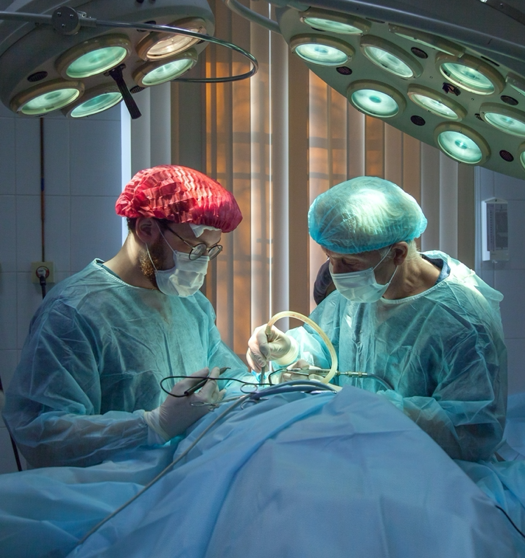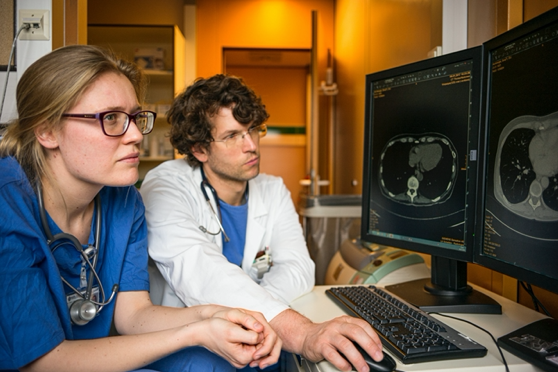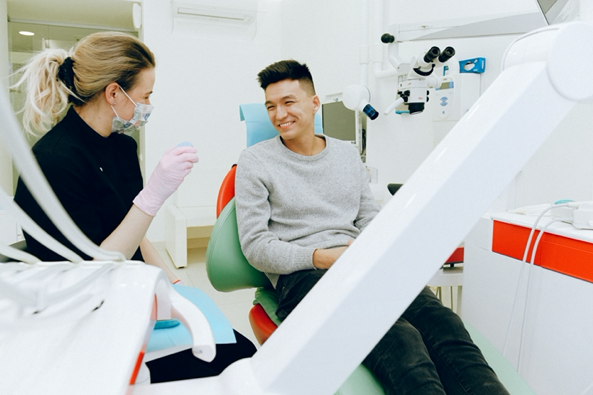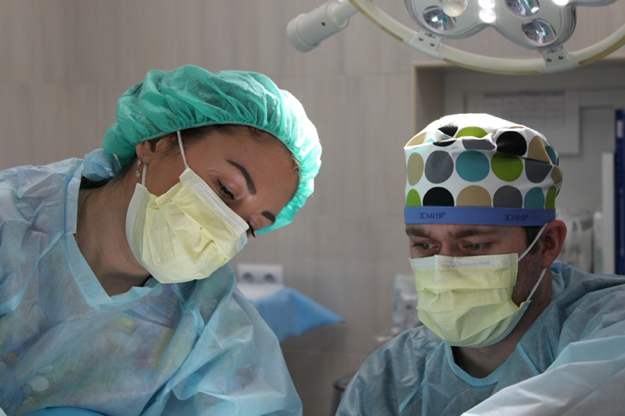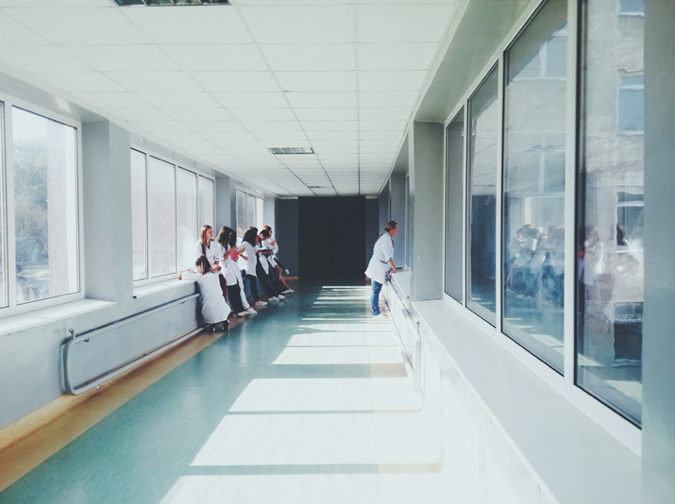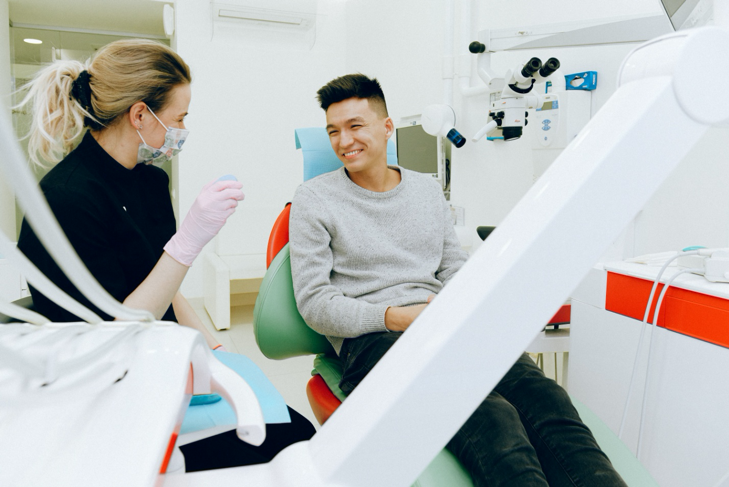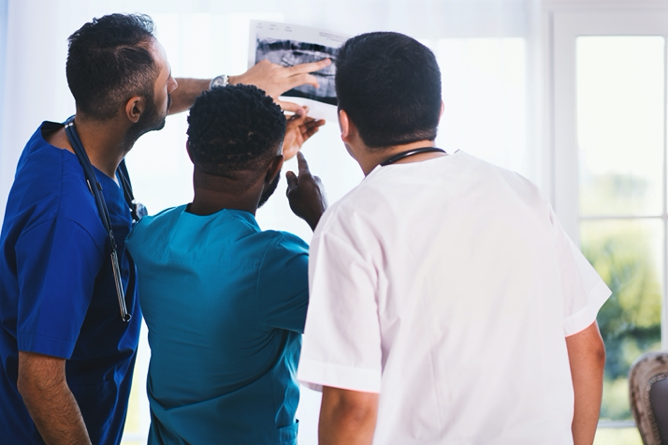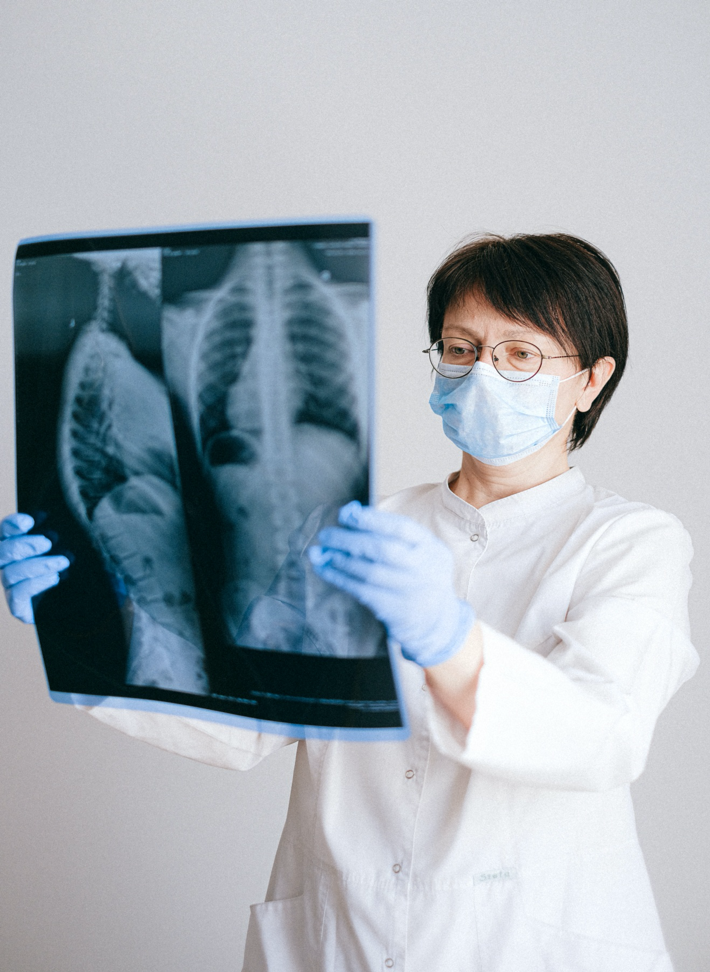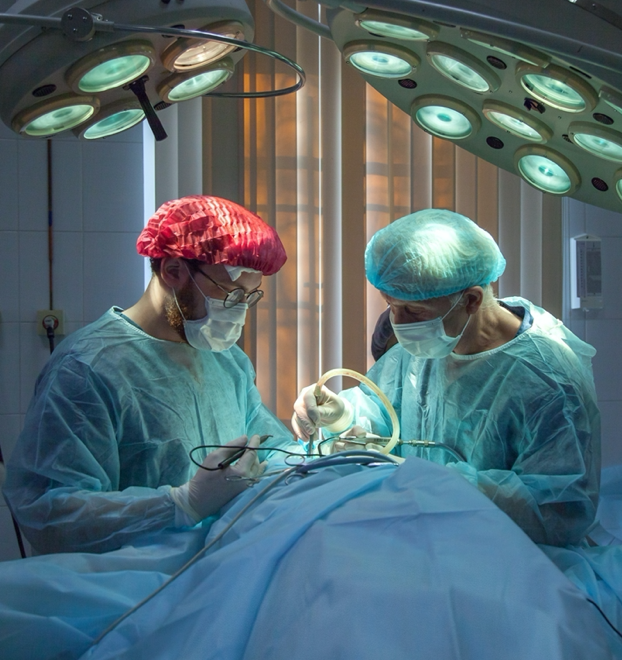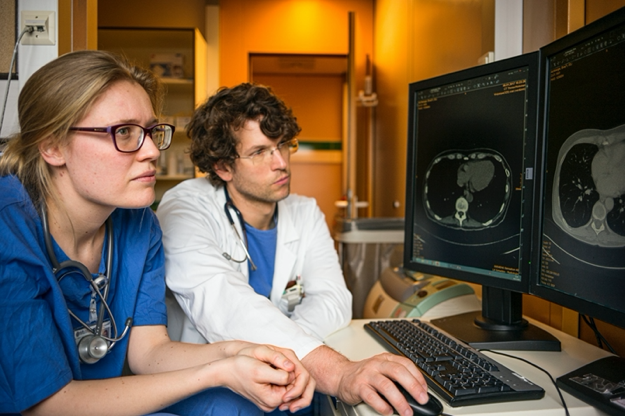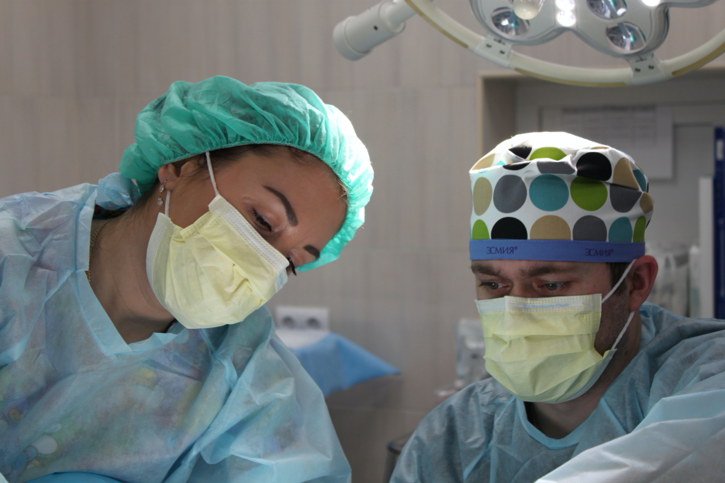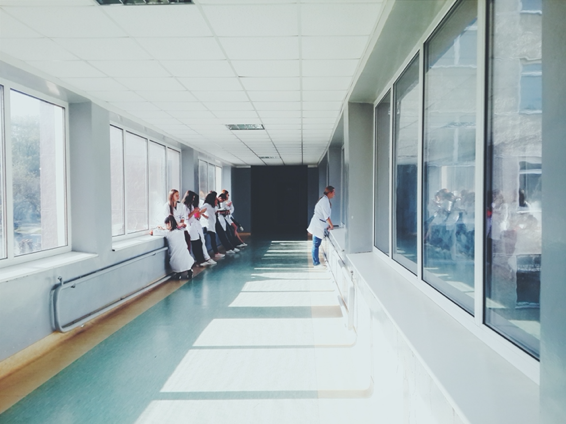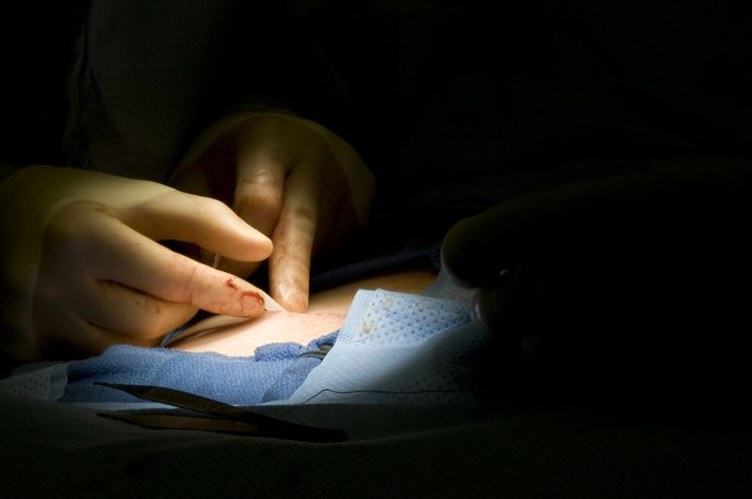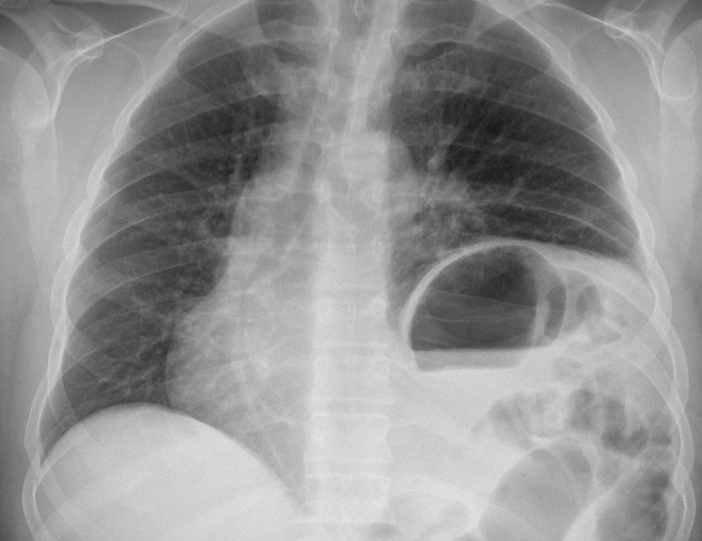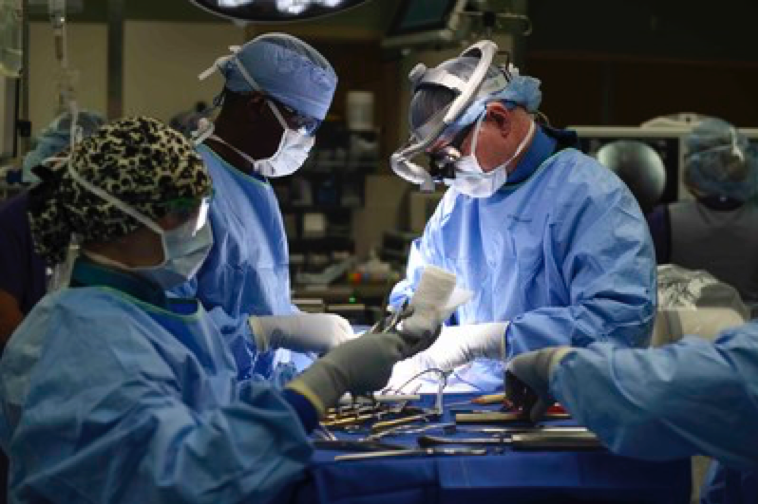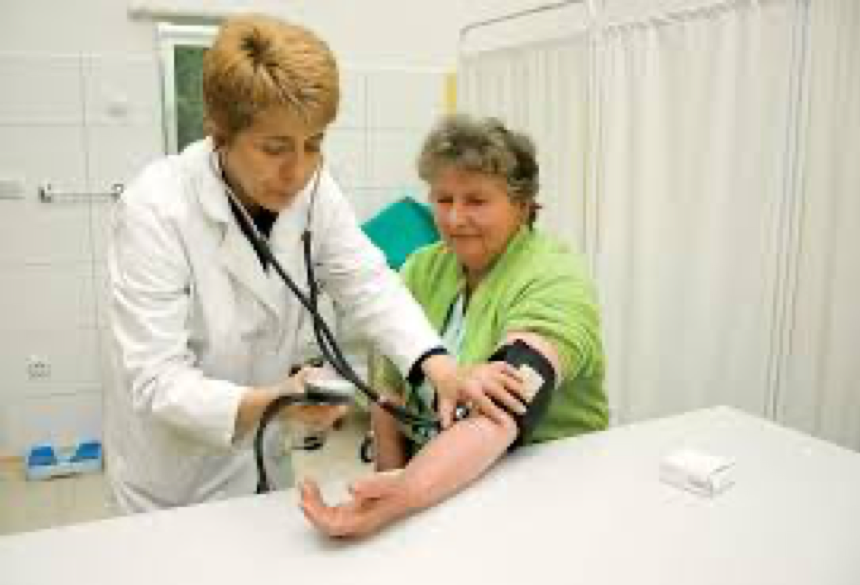CALL TODAY 646-846-1136 | EMAIL
Surgical Experts Dedicated to Improving Lives
At Lenox Hill Minimally Invasive Surgery PLLC, Dr. Valery Dronsky and his staff of medical professionals provide compassionate care with the highest ethical & professional standards. In our state of the art facility, we offer surgical services using only the most cutting edge and current procedures and treatments. We specialize in general surgery, including extensive experience in performing hernia repair surgery. Our expertise is in minimally invasive surgery and robotic surgery. Minimally invasive and robotic surgery often allow patients to experience easier recovery than traditional open surgery. They also allow for more precise and less traumatic surgery. When robotic and minimally invasive surgery is not an option, we are also skilled and experienced in traditional open surgical procedures.
Dr. Dronsky is an experienced and highly skilled surgeon having undergone extensive training in school, residency and fellowships. He practices medicine with ethical behavior, compassion and superb bedside manner. In the operating room he exhibits precision mechanical abilities, analytical thinking and the ability to visualize tissue in three dimensions. These innate and learned skills allow Dr. Dronsky to be one of the most dexterous and skilled professionals in New York City and the Country.
Call us: 646-846-1136
PATIENT TESTIMONIALS
Recent Awards
We are honored and deeply appreciative to have consistently received prestigious awards and recognition year after year, establishing us as one of New York’s foremost hospitals for a wide range of general surgeries, safety measures, specialized procedures, and overall excellence in healthcare. At Lenox Hill Minimally Invasive Surgery, our unwavering commitment lies in delivering exceptional care and unwavering support to our patients, guaranteeing their safety and successful recovery throughout their entire surgical experience.
Hospital Quality Awards
 America’s 50 Best Hospitals Award™ (2023, 2022)
America’s 50 Best Hospitals Award™ (2023, 2022)
Top 1% in the nation for providing the highest clinical quality year over year.

America’s 100 Best Hospitals Award™ (2021)
Top 2% in the nation for consistently delivering clinical quality year over year.

America’s 250 Best Hospitals Award™ (2023, 2022, 2021)
Top 5% in the nation for consistently delivering clinical quality.

Patient Safety Excellence Award™ (2023, 2022)
Top in the nation for providing excellence in patient safety by preventing infections, medical errors, and other preventable complications.
Specialty Clinical Quality Awards

America’s 100 Best Hospitals for Cardiac Care Award™ (2023, 2022, 2021, 2020, 2019)
Superior clinical outcomes in heart bypass surgery, coronary interventional procedures, heart attack treatment, heart failure treatment, and heart valve surgery.

America’s 100 Best Hospitals for Coronary Intervention Award™ (2023, 2022, 2021, 2020, 2019)
Superior clinical outcomes in coronary intervention procedures (angioplasty with stent).

America’s 100 Best Hospitals for Prostate Surgery Award™ (2023, 2022, 2021)
Superior clinical outcomes in prostate removal surgery and transurethral resection of the prostate.
Click to see all of our Healthgrades best doctors awards
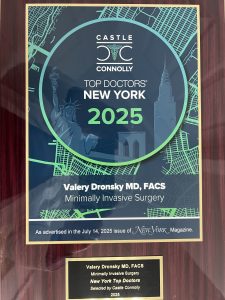
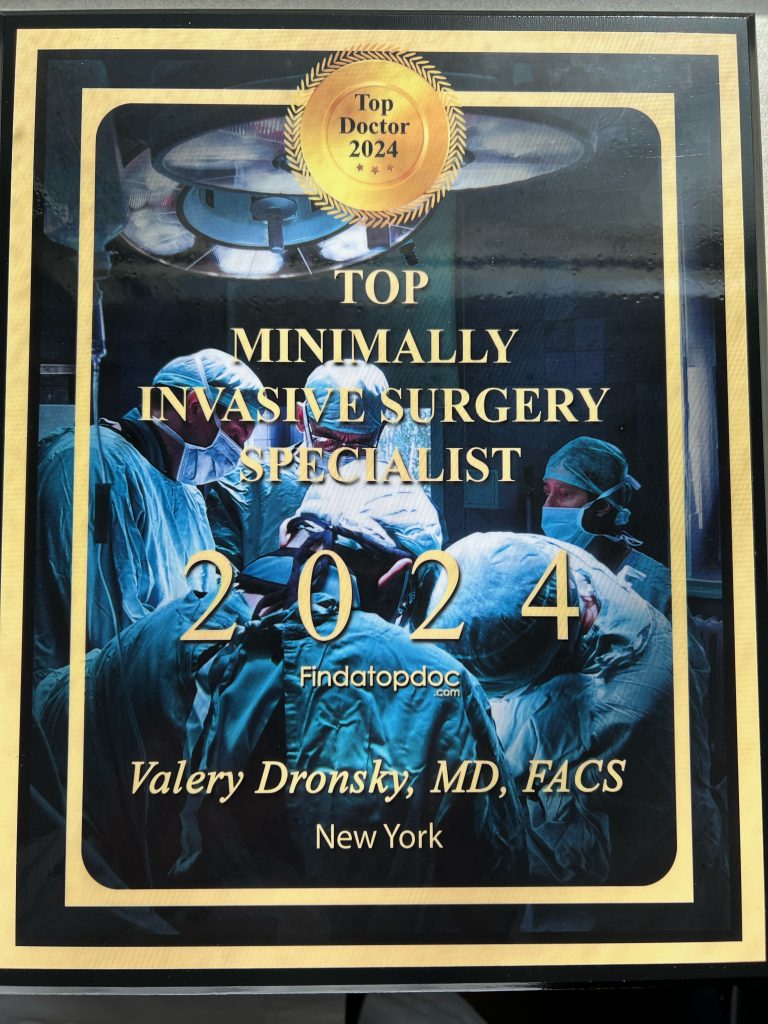
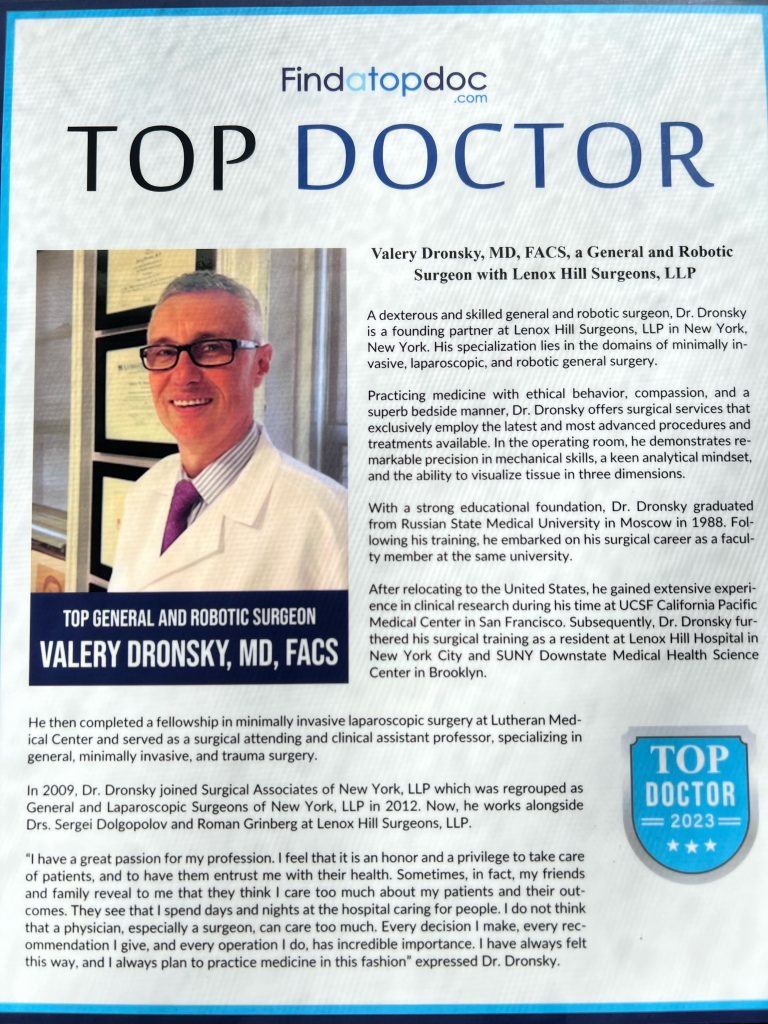


Visit our main website at www.LenoxHillMinimallyInvasiveSurgery.com
Blog Posts are Below:
Category Archives: Hernias
Hernia Repair: Types, Symptoms, and Treatment Options
If you’re experiencing discomfort or a noticeable bulge in your abdomen, it could be a hernia. Hernias occur when an organ or tissue protrudes through a weak spot in the surrounding muscle or connective tissue. They can cause pain, discomfort, and affect your quality of life. At Lenox Hill Minimally Invasive Surgery, a leading general surgery practice in New York City, our skilled surgeons specialize in hernia repair. In this guide, we’ll explore different types of hernias, their symptoms, and the available hernia repair options.
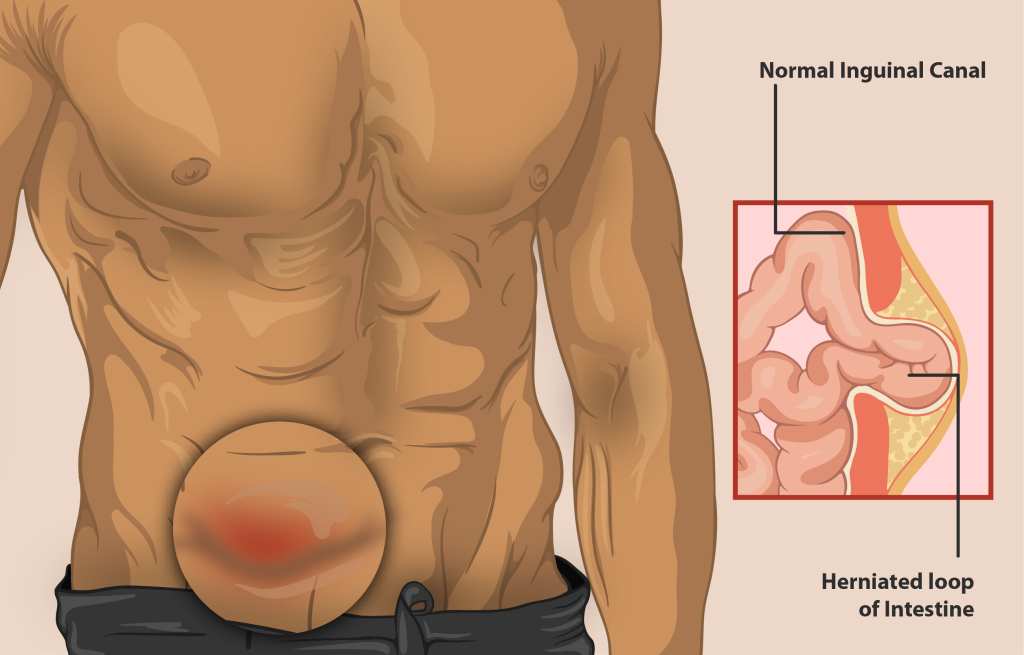
Types of Hernias
There are several types of hernias that can occur in different areas of the body. The most common types include:
- Inguinal Hernia: This occurs when a portion of the intestine or abdominal tissue protrudes through the inguinal canal in the groin area. It is more common in men than women.
- Femoral Hernia: Similar to an inguinal hernia, a femoral hernia also occurs in the groin area but is more common in women. It happens when a loop of intestine protrudes through the femoral canal.
- Incisional Hernia: This type of hernia develops at the site of a previous surgical incision. It can occur due to weak scar tissue, especially if the incision was large or did not heal properly.
- Umbilical Hernia: Umbilical hernias are common in infants but can also affect adults. They happen when the intestine or fatty tissue protrudes through a weakness near the navel.
- Hiatal Hernia: Unlike the previous types, hiatal hernias occur in the upper part of the stomach. They develop when a portion of the stomach protrudes through the diaphragm into the chest cavity.
Symptoms of Hernias
Hernias can present various symptoms, including:
- A visible or palpable bulge or lump in the affected area
- Pain or discomfort, especially when lifting heavy objects or straining
- Burning or aching sensation at the site of the hernia
- Nausea, vomiting, or difficulty with bowel movements in some cases
- Discomfort or pain during physical activity or prolonged standing
It’s important to note that not all hernias cause symptoms. Some hernias may be asymptomatic but still require medical attention to prevent potential complications.
Hernia Repair: Treatment Options
The primary treatment for hernias is surgical repair. At Lenox Hill Minimally Invasive Surgery, our experienced general surgeons offer several approaches to hernia repair, including:
- Open Hernia Repair: This traditional approach involves making an incision near the hernia site to access and repair the weakened area. The surgeon may use sutures or a mesh patch to reinforce the muscle or tissue.
- Laparoscopic Hernia Repair: A minimally invasive technique, laparoscopic hernia repair utilizes small incisions and a laparoscope, a thin tube with a camera, to guide the repair process. The surgeon inserts instruments through these small incisions and repairs the hernia using sutures or a mesh patch.
- Robotic-Assisted Hernia Repair: Robotic surgery combines the precision of robotics with the skills of the surgeon. This approach allows for enhanced dexterity and visualization during the repair process, resulting in excellent outcomes.
The choice of the surgical technique depends on several factors, including the type and size of the hernia, the patient’s overall health, and the surgeon’s expertise. During a consultation at Lenox Hill Minimally Invasive Surgery, our surgeons will discuss the most suitable approach for your specific case.
Expert Hernia Repair Surgery at Lenox Hill Minimally Invasive Surgery
If you’re experiencing symptoms of a hernia or have been diagnosed with one, seek prompt medical attention. At Lenox Hill Minimally Invasive Surgery, our team of skilled general surgeons is committed to providing exceptional hernia repair services. We prioritize patient safety, comfort, and long-term success.
Contact us today to schedule a consultation and discuss your hernia repair options.
LENOX HILL MINIMALLY INVASIVE SURGERY
117 E 77th Street
Suite 1A
New York, NY 10075
646-846-1136
admin@lenoxmis.com
Visit our website for more information: https://lenoxhillminimallyinvasivesurgery.com/
Types of Hernias: Ventral Hernia
What is a ventral hernia? Hernias can occur in any part of your body. Each different type of hernia gets its name depending on where it occurs. In its true nature, a hernia refers to a condition in which the internal muscle tissue weakens or becomes thin. In this case, the abdominal or whichever muscle cavity resting on that body protrudes outwards since the muscle is no longer holding it in place.
What is a Ventral Hernia?
A ventral hernia is a condition that occurs in the abdominal areas. It is just like any other abdominal hernia. Instead, it consists of a bulge of tissues pushing out from an opening of a weak muscular wall or scar tissue. This type of hernia can occur in any part of the stomach region.
People call abdominal hernias incisional hernia when it occurs on the healed incisions of past surgery. In this case, the abdominal regions tend to weaken because of the surgical incisions on the stomach. Due to this, the stomach tissues can bulge outwards and cause a lump in the area where the surgeons performed incisions.
Ventral Hernias can also become life-threatening due to strangulation. When a ventral hernia is strangulated, the blood stops entering into the protruding tissues. This is a serious sign of worry for the patient. In this scenario, the patients require urgent treatment in the form of surgery. Plus, in the case of strangulated ventral hernia, you cannot push it back because it gets stuck to the abdominal wall opening.
Causes
The most frequent cause of the ventral hernia is a post-surgical muscle weakening. After abdominal surgery, the incisions on your stomach tend to make your muscle linings weaker. Most of the time, people start to develop scar tissue in the abdominal region where the incisions took place. Scar tissue usually thins down the muscle wall, keeping a person open to the risks of ventral hernia.
Therefore, there is a high chance that a ventral hernia occurs in the exact region around the scar tissues. Other times, a ventral hernia may also occur due to hereditary reasons and as a symptom of adulthood. Nevertheless, there is no primary cause of a ventral hernia.
Symptoms
Symptoms of a ventral hernia vary to a great extent. They range not only in types but also the severity. It is also entirely possible that one does not feel any symptoms at all apart from the lump on the abdomen area. Furthermore, serious symptoms of the ventral hernia may take about weeks or months to appear.
Other symptoms include pain, discomfort, nausea, and even vomiting. These symptoms may take longer to show. Therefore, you must not keep waiting until you get a diagnosis and go instantly to a physician in the early stages of the hernia. Prolonging the condition will only make it worse and may lead to other complications.
The pain in the abdomen region also varies from person to person. If you have mild pain in the hernia, do not take that lightly, as the intensity of the pain may increase if you leave the hernia unchecked. Strangulation is a serious complication that can result over time.
Risks
The risk factors of ventral hernias are many. However, most patients become victim to a gene default, and hereditary reasons stand out amongst the rest. You need to take extra precautions if hernia is a common medical issue in your family.
These precautions include avoiding activities that put strain and stress on your abdomen. For instance, heavy lifting puts the most tension on your abdomen. Therefore, a person susceptible to a hernia should avoid it at all costs.
Other activities involve excessive smoking. It not only disrupts your gut health and causes it to weaken but also causes you to cough persistently. Coughing, sneezing, and laughing can also cause the hernia to occur.
Diagnosis
The most obvious diagnosis for the ventral hernia is to look for lumps in the abdomen region. Other times, a physician will also consider imaging tests such as abdominal ultrasound, CT scan, and MRI scan. These tests ultimately confirm the presence of the ventral hernia inside your abdomen.
Treatment
There are many treatment options available for the ventral hernia condition. The treatment depends on the severity of the condition. In cases of strangulation, the doctor will recommend the patient to a hernia repair surgeon. If an individual has an acute case of hernia, the doctor can physically push the hernia back into the stomach lining and prescribe over-the-counter medicines and rest for recovery.
Ventral Hernia: To Conclude
Abdominal issues are very complicated and require the expertise of experienced doctors for treatment. If you are looking for professional surgeons that specialize in hernia treatments, visit us at Lenox Hill Minimally Invasive Surgery in New York. Our state of the art facilities offers incredible surgical services and the best minimally invasive surgeries. Visit our main website or call us at 646-846-1136.
Types of Hernias: Inguinal Hernia
An Inguinal Hernia is a condition in which one spot of the abdominal muscle weakens, and this causes muscle tissue to protrude outwards, causing a bulge. Therefore, you can call this hernia a protrusion bulge as well. It is the projection of an organ through the muscle tissues that make up the body wall. Mostly, an Inguinal Hernia encompasses the projection of a particular part of an organ instead. Hernias can be either external or internal in classification.
What is Inguinal Hernia?
An Inguinal Hernia is a type of external hernia that occurs around the intestine and bladder region. Other people refer to this region as the groin area in the body. This type of hernia is the most common amongst other hernias. About 96 percent of hernia patients suffer from inguinal hernias.
In this type of hernia, the inguinal canals in the abdomens tend to weaken. This weakness is mostly a natural occurrence, while other times, it occurs due to excessive abdominal strain. Therefore, this weakening of the inguinal tissue causes intestinal tissue to protrude through and cause a lump in either the left or right side of the groin. This area makes up the base of the abdomen, just below the waistline.
Both men and women have inguinal canals and can suffer from inguinal hernia. A protruding bulge around this area is a clear indication that you are suffering from this condition. Many people tend to overlook this sign and leave it unnoticed. This is a highly dangerous circumstance, as leaving the bulge untreated for a long time can lead to further protrusion and serious conditions.
Types of Inguinal Hernias
There are four types of inguinal hernias, indirect, direct, incarcerated, and strangulated. Each type of inguinal hernias has differing severity and causes.
Indirect Inguinal Hernia
This is one of the most common types of inguinal hernias. It has an often occurrence amongst premature births. It is also a very common condition between males, even though it happens mostly at birth. You can be subject to it anytime in your life. The closing of the inguinal canal at the time of birth has much to do with this condition.
Direct Inguinal Hernia
The primary cause of direct inguinal hernia is old age. As you get older, the internal and external muscles in your body start to weaken. Therefore, doctors believe that a direct inguinal hernia happens because of the weakening of interior muscle tissues due to old age. This is evident because this type of hernia more commonly occurs in adult men.
Incarcerated Inguinal Hernia
In this situation, a person becomes unable to push back a bulge. This is because the bulging is stuck in the lower groin region and has no space to retrace inside.
Strangulated Inguinal Hernia
This is a critical condition of an inguinal hernia. It requires intensive and immediate medical care, and you need to treat it surgically. In this condition, the blood flow entering the inguinal hernia stops, and you start losing feeling in that specific region.
Symptoms
The most noticeable symptom of the inguinal hernia is the protruding bulge. The lumpy surface of the groin area is a clear indication that you have an inguinal hernia. Furthermore, the inguinal hernia tends to increase in size depending on your abdomen position. When the inguinal hernia worsens, it can lead to other complications such as pain, burning sensation, and even swelling.
Causes/Risk Factors
There is not a particular cause of a hernia that you can single out. Adults and senior citizens that suffer from hernias usually pay the price of lifelong stress on the abdominal region. The accumulated stress on the abdomen area can cause a person to undergo a groin hernia.
Furthermore, an inguinal hernia may also be a hereditary defect in a person. In this case, a person needs to be extra careful while lifting heavy objects. Not to mention, lifting heavy objects from the ground-up is a very common cause of hernias.
People make the mistake of carrying a heavy load without stabilizing their core. This leads to herniated complications in their abdomen. Other risk factors include being male, overweight, premature birth, constipation, and pregnancy.
Diagnosis and Treatment
An external hernia is very simple to diagnose for a physician. A physical examination of the patient shows the doctor a view of the bulging protrusion. By carefully looking at it, a doctor can tell what kind of a hernia it is. If the bulging lump is reducible and acute, your doctor will simply push the protrusion back while you lie down flat. For more serious and painful hernias, surgery will be required.
Prevention
The best way to stay away from the inguinal hernia is to live a healthy lifestyle. This involves frequently exercising so that you can maintain your body weight and strengthen your core. Moreover, you should also keep a good nutrition intake that is full of fiber and proteins. Fiber keeps your gut health in check and prevents you from constipation. It is also advisable to avoid smoking and lifting weights beyond your strength capacity.
Inguinal Hernia Conclusion: Contact Expert General Surgeons
If you or anyone you know is suffering from an inguinal hernia or any other type of hernia, then contact Lenox Hills Surgeons. We provide you with excellent treatment and professional consultation. Call us now on 646-846-1136 to book an appointment or visit our website for more information.
LENOX HILL MINIMALLY INVASIVE SURGERY
117 E 77th Street
Suite 1A
New York, NY 10075
646-846-1136
admin@lenoxmis.com
Do you Think you May Have a Hernia?
Do you think you may have a hernia? Read on to learn all about what hernias are and how they are caused. Many people classify Hernias into different kinds, Inguinal, Femoral, Incisional, and Umbilical. However, few understand the exact occurrence of the Hernia. You will find most of the hernia occurrences in the abdominal regions of the body. That said, a hernia can also make an appearance in the thighs and groin areas as well. Although most of the hernia conditions are not life-threatening, some can send patients into intensive care.
What is a Hernia?
A Hernia-induced pain is a pressure exerted by an internal organ on the tissue walls that are holding it. Organs tend to show protuberance around muscle linings, and this causes a person to feel intense pressure. If the hernia is abdominal, you may feel intense pain in the stomach, and depending on the severity, you may also need intensive care.
Since a hernia usually causes an organ to put pressure on the tissue or muscle, you can also notice an outward bulge on the stomach area in the case of an abdominal Hernia. Thus, a physician may simply look for an outward bulge for the diagnosis of a hernia.
The most obvious cause of a hernia is the weakening of a muscular wall that is keeping a specific organ in place. When a specific muscular wall is unable to withstand the pressure of an organ, then the organ pushes the wall, causing a lump. This bulging lump may diminish after wishful waiting and lying down. Furthermore, it can also make an appearance after intense coughing.
Common Causes of a Hernia
Ultimately, the only reason an organ will cause a muscle to bend is when a certain muscle is weak. Therefore, weak muscle linings and tissue is the sole cause of a hernia. The weakened spot on the tissue is a birth defect in some cases, while it can also be a cause of certain activities later on in life. Excessively performing any movement that imposes pressure on internal muscle organs is likely to cause a hernia over a long period. The following are some of the activities.
- Straining your abdominal muscles while defecating in the toilet (People who have a bad case of constipation are vulnerable to hernia as well)
- Excessive coughing (Dry coughs usually cause your abdominal muscles to tighten. Thus, repetitive coughing episodes put unnecessary strain on the stomach)
- Persistent sneezing
- Obesity
- Smoking (Smoking causes excessive coughing, and long term smoking can also potentially cause internal damage to abdominal muscles)
- Heavy Lifting (you can run the risk of a hernia when you lift a heavy object from the ground without stabilizing your abdominal core. You must always engage your core before you lift a heavy object from the ground to avoid excessive strain on your muscles.)
- Physical Exertion
Symptoms
In most instances, a hernia will cause a swelling in the particular region. In this circumstance, the hernia poses no immediate danger, and resting will cause it to diminish over time. Other symptoms of acute hernia such as this include pain, discomfort, and excessive strain while walking.
However, some cases are more severe and can lead to other symptoms such as nausea, vomiting, and even blood in the stool. In these cases, a person needs immediate surgery for the herniated area. In the case of a Hiatal Hernia, the swelling is not present on the surface. The person experiences symptoms such as heartburn, indigestion, chest pain, and difficulty swallowing.
Furthermore, you can also push the hernia-induced lump or bulge back in the stomach. Most people opt for lying straight down to flatten the lump. It also helps to avoid activities that can trigger a bulgy reaction on the stomach. These activities include laughing, coughing, crying, or any other form of physical exertion.
Prevention
If you want to minimize your risk of a hernia, then it is ideal that you maintain your body weight. Regular exercises and a healthy diet result in the strengthening of muscles. Moreover, you can also train your abdominal muscles to withstand an excessive amount of pressure.
Besides training and exercising, you also have to make sure that you avoid lifting heavy objects. Even if you want to lift heavy weights, make sure that you go through proper training, warm-up, and technical insight over core engagement.
Additionally, you must take care of your nutrition. Avoid meals that evoke constipation and stomach issues. Make sure that your meals involve adequate micronutrients and fiber so that you can pass stool smoothly, without complications.
Lastly, avoid the habit of smoking. Smoking is not just harmful to your lungs but also causes persistent coughing and sneezing. This ultimately can result in a hernia if you do not treat it soon enough. Make sure that you visit the doctor in the case of coughs.
Do You Have a Hernia? Consult a Top Surgeon
If you feel like you have a hernia, make a quick self-diagnosis and do not prolong the symptoms. Seek professional help immediately. Waiting on a hernia can make the situation worse; the earlier the treatment, the better. Lenox Hill Minimally Invasive Surgery provide the best Hernia treatment, diagnosis, and services in New York. Contact them at 646-846-1136 to book an appointment now.
Inguinal Hernia
An Inguinal Hernia is a condition in which one spot of the abdominal muscle weakens, and this causes muscle tissue to protrude outwards, causing a bulge. Therefore, you can call this hernia a protrusion bulge as well. It is the projection of an organ through the muscle tissues that make up the body wall. Mostly, an Inguinal Hernia encompasses the projection of a particular part of an organ instead. Hernias can be either external or internal in classification.
What is Inguinal Hernia?
An Inguinal Hernia is a type of external hernia that occurs around the intestine and bladder region. Other people refer to this region as the groin area in the body. This type of hernia is the most common amongst other hernias. About 96 percent of hernia patients suffer from inguinal hernias.
In this type of hernia, the inguinal canals in the abdomens tend to weaken. This weakness is mostly a natural occurrence, while other times, it occurs due to excessive abdominal strain. Therefore, this weakening of the inguinal tissue causes intestinal tissue to protrude through and cause a lump in either the left or right side of the groin. This area makes up the base of the abdomen, just below the waistline.
Both men and women have inguinal canals and can suffer from inguinal hernia. A protruding bulge around this area is a clear indication that you are suffering from this condition. Many people tend to overlook this sign and leave it unnoticed. This is a highly dangerous circumstance, as leaving the bulge untreated for a long time can lead to further protrusion and serious conditions.
Types
There are four types of inguinal hernias, indirect, direct, incarcerated, and strangulated. Each type of inguinal hernias has differing severity and causes.
Indirect Inguinal Hernia
This is one of the most common types of inguinal hernias. It has an often occurrence amongst premature births. It is also a very common condition between males, even though it happens mostly at birth. You can be subject to it anytime in your life. The closing of the inguinal canal at the time of birth has much to do with this condition.
Direct Inguinal Hernia
The primary cause of direct inguinal hernia is old age. As you get older, the internal and external muscles in your body start to weaken. Therefore, doctors believe that a direct inguinal hernia happens because of the weakening of interior muscle tissues due to old age. This is evident because this type of hernia more commonly occurs in adult men.
Incarcerated Inguinal Hernia
In this situation, a person becomes unable to push back a bulge. This is because the bulging is stuck in the lower groin region and has no space to retrace inside.
Strangulated Inguinal Hernia
This is a critical condition of an inguinal hernia. It requires intensive and immediate medical care, and you need to treat it surgically. In this condition, the blood flow entering the inguinal hernia stops, and you start losing feeling in that specific region.
Symptoms
The most noticeable symptom of the inguinal hernia is the protruding bulge. The lumpy surface of the groin area is a clear indication that you have an inguinal hernia. Furthermore, the inguinal hernia tends to increase in size depending on your abdomen position. When the inguinal hernia worsens, it can lead to other complications such as pain, burning sensation, and even swelling.
Causes/Risk Factors
There is not a particular cause of a hernia that you can single out. Adults and senior citizens that suffer from hernia usually pay the price of lifelong stress on the abdominal region. The accumulated stress on the abdomen area can cause a person to undergo a groin hernia.
Furthermore, an inguinal hernia may also be a hereditary defect in a person. In this case, a person needs to be extra careful while lifting heavy objects. Not to mention, lifting heavy objects from the ground-up is a very common cause of hernias.
People make the mistake of carrying a heavy load without stabilizing their core. This leads to herniated complications in their abdomen. Other risk factors include being male, overweight, premature birth, constipation, and pregnancy.
Diagnosis and Treatment
An external hernia is very simple to diagnose for a physician. A physical examination of the patient shows the doctor a view of the bulging protrusion. By carefully looking at it, a doctor can tell what kind of a hernia it is. If the bulging lump is reducible and acute, your doctor will simply push the protrusion back while you lie down flat.
Prevention
The best way to stay away from this type of hernia is to live a healthy lifestyle. This involves frequently exercising so that you can maintain your body weight and strengthen your core. Moreover, you should also keep a good nutrition intake that is full of fiber and proteins. Fiber keeps your gut health in check and prevents you from constipation. It is also advisable to avoid smoking and lifting weights beyond your strength capacity.
Conclusion: Consult the Hernia Experts at Lenox Hill Minimally Invasive Surgery
If you or anyone you know is suffering from an inguinal hernia or any other type of hernia, then contact Lenox Hill Minimally Invasive Surgery. Their highly experienced hernia surgeons will provide you with the best treatment options and professional consultation.
Call us now at 646-846-1136 to book an appointment or visit our website for more information.
Hiatal Hernia
What is a hiatal hernia? Hernias are disruptive conditions in which the tissue linings or muscle walls become unable to hold the tissue cavities in place. It happens due to the weakening or thinning down of muscle tissue. Abdominal hernias are the most common type of hernias. Hernias come in two forms, either external or internal. The more common external hernia causes a lump to form on the surface of the skin. In comparison, the internal hernias show a different set of symptoms. However, symptoms vary depending on severity.
Hiatal Hernia
A Hiatal hernia is an internal hernia. The name “Hiatal hernia” comes from its region of occurrence, which is the hiatus. The hiatus is a small opening in the diaphragm through the esophagus or the food tube passing from your chest to your stomach.
In the case of a Hiatal Hernia, the upper region of your stomach cavity starts to bulge out of the hiatus and into the chest. The severity of the Hiatal Hernia depends on whether it is a sliding hiatal hernia or a paraesophageal hernia.
Sliding Hiatal Hernia
A sliding hiatal hernia is normally not that big of an issue. Although they can cause slight discomfort, they do not pose a serious threat to an individual. The outward bulge of the stomach cavity is rather small, and the stomach, along with the lower esophagus, slides slightly into the chest region. A person that encounters this hernia will experience heartburn or acidity.
Fixed Hiatal Hernia or Paraesophageal Hernia
This type of hernia is more of a threat for an individual. This occurrence does not involve the shifting of the stomach or the esophagus. Instead, a part of your stomach’s cavity squeezes its way into the hiatus. In this circumstance, a person enters the danger of losing blood supply to that specific region because of the tight squeeze.
Doctors even refer to this condition as strangulation of the hernia. The most alarming thing about this hernia is that a person will rarely experience any symptoms. Therefore, if a doctor comes to a conclusive diagnosis of this condition while judging other underlying symptoms, then it may be too late.
Symptoms
It is rare for a person with Hiatal Hernia to show symptoms. Usually, the symptoms encompass a series of problems that relate to ingestion and digestion. This is obvious because both the fixed hernia and sliding hernia have to do with the displacement in the abdomen region.
Therefore, people suffering from these conditions will experience heartburns or acid reflux. Since the stomach and esophagus get closer to the chest region, a person may have trouble with stomach acid and experience acidity. Other symptoms may include:
- Chest pain
- Excessive Burping
- Harsh taste in the mouth
- Stomach ache
- Vomiting
- Shortness of breath
- Bloating
- Swallowing issues
- Bolus Backflow
Furthermore, symptoms such as excruciating stomach pain, vomiting, or inability to pass stool require immediate medical attention. These symptoms are indications of the worsening of fixed hernias and call for an emergency.
Causes
Hernias are nothing but the weakening of internal tissues and their inability to withstand the pressure of the organ or organ cavity against it. Thus, there is no clear reason why a person undergoes a hernia. That said, doctors believe that a hiatal hernia is most likely a case of old age.
As a person gets older, their muscular firmness tends to weaken, and the muscle lining can become thin. Another possibility for the development of a hernia can be the changes in the diaphragm that can come with adulthood and worsen as you get older.
Damage to the diaphragm due to an injury is also another cause of hiatal hernia. Muscular damage can weaken the diaphragm and the hiatus. This injury can be a result of an accident or even activities that put a strain on your diaphragm, such as coughing, heavy lifting, vomiting, and others.
Diagnosis
Since a hiatal hernia is an internal hernia, the doctor cannot diagnose this condition with a routine physical examination. For the diagnosis of a Hiatal hernia, a doctor analyzes the underlying symptoms. If the symptoms correspond to this type of hernia, the doctor is likely to run some test procedures. These tests include:
- X-RAY (x-ray photographs can reveal abnormal displacements of your stomach, making it easier to diagnose Hiatal hernia)
- Endoscopy (This is a thin tube with a camera. The doctor inserts this tube into your esophagus for this test)
- Esophageal Manometry (This test reveals the rhythmic pattern of the esophageal muscle contractions when a person swallows.)
Hiatal Hernia: To Conclude
Lenox Hill Minimally Invasive Surgery is a state of the art facility in New York City. Our team of surgeons specialize in Hernia treatment and surgery. If you or your loved one is suffering from such a condition, then visit us for expert consultancy and treatment.
You can find more information on our website, or call us at 646-846-1136.
Ventral Hernia Causes, Symptoms & Treatment
What is a ventral hernia? Hernias can occur in any part of your body. Each different type of hernia gets its name depending on where it occurs. In its true nature, a hernia refers to a condition in which the internal muscle tissue weakens or becomes thin. In this case, the abdominal or whichever muscle cavity resting on that body protrudes outwards since the muscle is no longer holding it in place.
What is a Ventral Hernia?
A ventral hernia is a condition that occurs in the abdominal areas. It is just like any other abdominal hernia. Instead, it consists of a bulge of tissues pushing out from an opening of a weak muscular wall or scar tissue. This type of hernia can occur in any part of the stomach region.
People call abdominal hernias incisional hernia when it occurs on the healed incisions of past surgery. In this case, the abdominal regions tend to weaken because of the surgical incisions on the stomach. Due to this, the stomach tissues can bulge outwards and cause a lump in the area where the surgeons performed incisions.
Ventral Hernias can also become life-threatening due to strangulation. When a ventral hernia is strangulated, the blood stops entering into the protruding tissues. This is a serious sign of worry for the patient. In this scenario, the patients require urgent treatment in the form of surgery. Plus, in the case of strangulated ventral hernia, you cannot push it back because it gets stuck to the abdominal wall opening.
Ventral Hernia: Causes
The most frequent cause of the ventral hernia is a post-surgical muscle weakening. After abdominal surgery, the incisions on your stomach tend to make your muscle linings weaker. Most of the time, people start to develop scar tissue in the abdominal region where the incisions took place. Scar tissue usually thins down the muscle wall, keeping a person open to the risks of ventral hernia.
Therefore, there is a high chance that a ventral hernia occurs in the exact region around the scar tissues. Other times, a ventral hernia may also occur due to hereditary reasons and as a symptom of adulthood. Nevertheless, there is no primary cause of a ventral hernia.
Ventral Hernia: Symptoms
Symptoms of a ventral hernia vary to a great extent. They range not only in types but also the severity. It is also entirely possible that one does not feel any symptoms at all apart from the lump on the abdomen area. Furthermore, serious symptoms of the ventral hernia may take about weeks or months to appear.
Other symptoms include pain, discomfort, nausea, and even vomiting. These symptoms may take longer to show. Therefore, you must not keep waiting until you get a diagnosis and go instantly to a physician in the early stages of the hernia. Prolonging the condition will only make it worse and may lead to other complications.
The pain in the abdomen region also varies from person to person. If you have mild pain in the hernia, do not take that lightly, as the intensity of the pain may increase if you leave the hernia unchecked. Strangulation is a serious complication that can result over time.
Risks
The risk factors of ventral hernias are many. However, most patients become victim to a gene default, and hereditary reasons stand out amongst the rest. You need to take extra precautions if hernia is a common medical issue in your family.
These precautions include avoiding activities that put strain and stress on your abdomen. For instance, heavy lifting puts the most tension on your abdomen. Therefore, a person susceptible to a hernia should avoid it at all costs.
Other activities involve excessive smoking. It not only disrupts your gut health and causes it to weaken but also causes you to cough persistently. Coughing, sneezing, and laughing can also cause the hernia to occur.
Diagnosis
The most obvious diagnosis for the ventral hernia is to look for lumps in the abdomen region. Other times, a physician will also consider imaging tests such as abdominal ultrasound, CT scan, and MRI scan. These tests ultimately confirm the presence of the ventral hernia inside your abdomen.
Ventral Hernia: Treatment
There are many treatment options available for the ventral hernia condition. The treatment depends on the severity of the condition. In cases of strangulation, the doctor will recommend the patient to a hernia repair surgeon. If an individual has an acute case of hernia, the doctor can physically push the hernia back into the stomach lining and prescribe over-the-counter medicines and rest for recovery.
To Conclude: Consult Lenox Hill Minimally Invasive Surgery
Abdominal issues are very complicated and require the expertise of experienced doctors for treatment. If you are looking for professional surgeons that specialize in hernia treatments, visit us at Lenox Hill Minimally Invasive Surgery in New York. Our state of the art facilities offer incredible surgical services and the best minimally invasive surgeries. Visit our website or call us at (212) 988- 1136.
All About Hernias
Many people classify Hernias into different kinds, Inguinal, Femoral, Incisional, and Umbilical. However, few understand the exact occurrence of the Hernia. You will find most of the hernia occurrences in the abdominal regions of the body. That said, a hernia can also make an appearance in the thighs and groin areas as well. Although most of the hernia conditions are not life-threatening, some can send patients into intensive care.
What is a Hernia?
A Hernia-induced pain is a pressure exerted by an internal organ on the tissue walls that are holding it. Organs tend to show protuberance around muscle linings, and this causes a person to feel intense pressure. If the hernia is abdominal, you may feel intense pain in the stomach, and depending on the severity, you may also need intensive care.
Since a hernia usually causes an organ to put pressure on the tissue or muscle, you can also notice an outward bulge on the stomach area in the case of an abdominal Hernia. Thus, a physician may simply look for an outward bulge for the diagnosis of a hernia.
The most obvious cause of a hernia is the weakening of a muscular wall that is keeping a specific organ in place. When a specific muscular wall is unable to withstand the pressure of an organ, then the organ pushes the wall, causing a lump. This bulging lump may diminish after wishful waiting and lying down. Furthermore, it can also make an appearance after intense coughing.
Common Causes of a Hernia
Ultimately, the only reason an organ will cause a muscle to bend is when a certain muscle is weak. Therefore, weak muscle linings and tissue is the sole cause of a hernia. The weakened spot on the tissue is a birth defect in some cases, while it can also be a cause of certain activities later on in life. Excessively performing any movement that imposes pressure on internal muscle organs is likely to cause a hernia over a long period. The following are some of the activities.
- Straining your abdominal muscles while defecating in the toilet (People who have a bad case of constipation are vulnerable to hernia as well)
- Excessive coughing (Dry coughs usually cause your abdominal muscles to tighten. Thus, repetitive coughing episodes put unnecessary strain on the stomach)
- Persistent sneezing
- Obesity
- Smoking (Smoking causes excessive coughing, and long term smoking can also potentially cause internal damage to abdominal muscles)
- Heavy Lifting (you can run the risk of a hernia when you lift a heavy object from the ground without stabilizing your abdominal core. You must always engage your core before you lift a heavy object from the ground to avoid excessive strain on your muscles.)
- Physical Exertion
All About Hernias: Symptoms
In most instances, a hernia will cause a swelling in the particular region. In this circumstance, the hernia poses no immediate danger, and resting will cause it to diminish over time. Other symptoms of acute hernia such as this include pain, discomfort, and excessive strain while walking.
However, some cases are more severe and can lead to other symptoms such as nausea, vomiting, and even blood in the stool. In these cases, a person needs immediate surgery for the herniated area. In the case of a Hiatal Hernia, the swelling is not present on the surface. The person experiences symptoms such as heartburn, indigestion, chest pain, and difficulty swallowing.
Furthermore, you can also push the hernia-induced lump or bulge back in the stomach. Most people opt for lying straight down to flatten the lump. It also helps to avoid activities that can trigger a bulgy reaction on the stomach. These activities include laughing, coughing, crying, or any other form of physical exertion.
All About Hernias: Prevention
If you want to minimize your risk of a hernia, then it is ideal that you maintain your body weight. Regular exercises and a healthy diet result in the strengthening of muscles. Moreover, you can also train your abdominal muscles to withstand an excessive amount of pressure.
Besides training and exercising, you also have to make sure that you avoid lifting heavy objects. Even if you want to lift heavy weights, make sure that you go through proper training, warm-up, and technical insight over core engagement.
Additionally, you must take care of your nutrition. Avoid meals that evoke constipation and stomach issues. Make sure that your meals involve adequate micronutrients and fiber so that you can pass stool smoothly, without complications.
Lastly, avoid the habit of smoking. Smoking is not just harmful to your lungs but also causes persistent coughing and sneezing. This ultimately can result in a hernia if you do not treat it soon enough. Make sure that you visit the doctor in the case of coughs.
Conclusion: Consult Lenox Hill Minimally Invasive Surgery
If you feel like you have a hernia, make a quick self-diagnosis and do not prolong the symptoms. Seek professional help immediately. Waiting on a hernia can make the situation worse; the earlier the treatment, the better.
Lenox Hill Minimally Invasive Surgery provide the best Hernia treatment, diagnosis, and services in New York. Contact them at 646-846-1136 to book an appointment now.
Hernia Repair: When is it Necessary?
When are hernia repairs necessary? When fatty tissue or any organ forces out a weak part, which is surrounded by the connective muscle wall or tissue, it leads to hernia. It usually protrudes in the lower abdomen, but may also develop in other body parts. Your body can’t cure it on its own. Typically, hernia gets bigger. In the worst cases, it can lead to life-threatening complications. Because of the harmful nature of this problem, doctors mostly recommend surgery.
However, every hernia doesn’t need emergency surgery, and it can wait for a while in some cases. This aspect depends on the size and symptoms of a hernia. The surgery of hernia repair involves pushing back the body part to its place and making sure that it remains in its place.
Hernia Repair Surgery: an Overview
The surgery becomes necessary if the hernia starts to cause long-term and worsen pains or discomfort to the patient. Moreover, mostly, hernia becomes noticeable after 1 to 2 years. You will feel the hernia when it starts to emit painful or irritating symptoms. Some people notice hernia symptoms only when they are doing any activities, such as intensive exercises.
Symptoms of Hernia
The following are some hernia symptoms, which makes it important to undergo surgical repair.
- long-term pain or discomfort
- Irritation or pain that disturbs regular activities
- Discomfort or pain increases or gets worst after time.
- The large size of the hernia
- The rapid growth of hernia
- Hernia in the place where it can get worst or enlarge, such as the groin
- Vomiting or severe abdominal pain
- A hernia that pressurizes the nerves, causing numbness or irritation
Some patients may not show visible or painful symptoms. Others may only experience sensitivity on the skin surrounding the bulge. But hernia can’t repair on its own or heal without surgery. So, when and if it shows negative signs, surgery is necessary.
Do You Need Hernia Surgery?
Your doctor will suggest you treat it with surgery if any of the following things happen with you.
- Tissue can trap into the abdominal wall, called incarceration. If you don’t cure it, it can lead to strangulation, which prevents the blood from reaching the tissues.
- It may strangulate your organs. This problem can lead to permanent damage, and you need to treat it immediately. The strangulated organs, such as intestines, can die. If not treated quickly, you can become severely ill. Make sure to call your doctors if you have nausea, fever, or pain, which gets worse, and hernia transforms into purple, red, or dark.
- If it’s causing chronic pains or discomfort, or its start to magnify.
The hernia can wait for the surgery if the following things happen with you:
- Lying down causes your hernia to go away, or you are able to bulge it back into your belly.
- Your hernia is small-size and causes no or few less severe symptoms.
Complication of Surgery
Like other surgical procedures, hernia repair surgeries also have some side effects or risks involved. The incision can sometimes be noticeably red and inflamed. It is also painful when you touch it.
The anti-inflammatory medication can help you lower down the inflammation and other related symptoms. You can also reduce inflammation by applying ice to the affected area for 10 minutes once every hour.
The following are some related risks and complications of hernia.
- Tissue or organ damage
- Infection
- Reoccurrence of hernia
- Seroma under the surface of the skin
- Nerve damage
- Nerve pain that also causes tingling
- Constipation
- Blood clot
- Lung infection and breathing problems
- Difficulty in urinating
- Urine leakage or incontinence
- Mech pain
- Kidney failure or complications
However, note that hernia repair is the shortest and most common surgical procedure. And if you consult a professional surgeon for your hernia repair, the risk levels decrease. Remember, not all hernias are life-threatening.
Hernia Repair: When is it Necessary? Bottom Line
The hernia is a serious health problem that needs treatment and extensive care. You can’t treat it with just herbs or wait for some miracle to cure your problem. The surgery becomes necessary when hernia enlarges or worsens. Your doctor will recommend you which type of surgery can help you more and which one is best to avoid any risk and complications.
You must take your health seriously to prevent other problems caused by the hernia. This is why you need a health professional that can treat your hernia and save you from future issues. Lenox Hill Minimally Invasive Surgery can help you in this case. We have highly professional surgeons who use most modern technological methods and equipment to treat your hernia.
Contact us on our website or call us on 646-846-1136 to get your appointment.
Types of Hernias & Surgery
Most hernias show little to no symptoms, but it can become a chronic health problem. A patient feels intense pain and irritation when it gets worst. It mostly needs surgery to cure the problem completely. Moreover, there is no age limitation to develop a hernia in your body.
There are multiple types of hernia that need different treatments and surgeries. Let’s learn about some of them.
Types of Hernia
There are several types of hernia. The following are some most of the common forms of hernia.
· Inguinal Hernia
This is the most common form of hernia. An inguinal hernia occurs when your intestines tear in the lower abdominal wall or push through a weak place, mostly in the inguinal canal. Moreover, it also occurs predominantly in men.
In case you don’t know, the inguinal canal is present in your groin. In men, it is the place where spermatic cord travels from the abdomen to the scrotum. This cord places the testicles at its location. Whereas, women have this place in the inguinal canal, which has a ligament that helps to hold the uterus.
Men suffer more from this hernia because the testicles move down through the inguinal canal after birth. The canal needs to be closed entirely behind them. But sometimes the canal doesn’t close properly, which makes the area a weak spot.
Hiatal Hernia
It occurs when a spot of the stomach protrudes up and gets into your chest through the diaphragm. The diaphragm is a layer of muscles that helps you to inhale and exhale. It separates the organs of the abdomen and chest.
People age 50 or older are more prone to this hernia. Children can also develop this condition caused by a congenital disability.
Moreover, this hernia always leads to gastroesophageal reflux. It happens because your stomach’s contents get back to the esophagus, which causes burning sensations.
Umbilical Hernia
This hernia can occur in babies and children. It happens when children’s intestine bulges through the abdominal wall around their belly button, and you can notice the bulge near it.
However, this is the only type of hernia that sometimes goes away on its own when the abdominal wall becomes stronger, mostly, when the child turns to 1 or 2 years. The child needs surgery if the hernia doesn’t go away until the age of 5 years.
Adults can also develop this problem because of the pressure on the abdomen. In men, it can occur due to obesity, or fluid in the gut, whereas, women with multiple pregnancies are also prone to this condition.
Ventral Hernia
This hernia occurs when the tissue erupts through a hole in the muscles of your abdomen. You can notice its presence when you lie down.
A person can also have it from birth, but it usually occurs at any point in your life. Obesity, pregnancy, and intensive exercises can become the factor of its occurrence.
This hernia also occurs at the spot of a surgical incision and called incision hernia. It can happen because of the weak abdominal muscles or surgical scarring at the place of surgery.
Types of Repair
Different types of hernia need different types of surgeries. The following are some types of hernia surgery.
Herniorrhaphy (Tissue Repair)
Herniorrhaphy is the oldest method to repair the hernia and is still commonly used. This repair requires the surgeon to make a long incision directly over the hernia and use surgical tools to open it to get to the hernia.
Your surgeon removes the hernia sac after that tissue or organs return to their original position. They stitch the sides of the muscle hole through which they draw out the hernia from your body. After sterilizing the wound, the surgeon stitches it entirely.
Hernioplasty (Mesh Repair)
It is also known as tension-free hernia repair. Hernioplasty is a little different; instead of stitching the muscle, your surgeon covers it with a sterile, flat mesh. The mesh comes in different types of plastics, such as animal tissue and polypropylene.
The surgeon makes small cuts in the shape of the mesh in the surrounding area of the hole. After that, they stitch the mesh into the healthy tissues. The weak tissue around the hernia uses the patch as support to regrow.
Bottom Line
The hernia is a painful health problem and sometimes need the treatment immediately. It is a severe issue that needs good care and the best treatment. In this case, take help from the experts that have specialization related to the hernia.
Lenox Hill Minimally Invasive Surgery are a compassionate team of surgeons who are experts in this field for years. These professionals meet all ethical standards and have done thousands of successful surgeries. You can contact us on our website or take an appointment on 646-846-1136.
Types of Hernias
A hernia can be any one of a category of conditions that involve the protrusion of tissue through the muscles that are supposed to hold it in place. There are many different types of hernias, each presenting a little bit differently and requiring different treatment. However, there are a few distinct characteristics that all hernias have in common.
Common Traits of Hernias
As mentioned above, all hernias are the bulging of an organ or another tissue through the muscular wall surrounding it. When the material breaks through, this typically causes some level of pain. Typically, the amount of pain increases when the location of the hernia is under stress. This can be caused by lifting, twisting, coughing, or stretching. The underlying cause of many hernias is simply weak muscle fibers. In the abdominal cavity and surrounding areas, tissue is held in place by a wall of muscle. These organs, fatty deposits, or other structures are simply held in place by the tension of the muscles in question. When there is weakness in the supportive muscle, small gaps can form, allowing openings for hernias to be created. Once enough pressure has been put on the area, the compressed tissue will forcefully expand out through the cavity in the muscle wall. This small protrusion of tissue is the hernia.
Inguinal Hernias
In the case of an inguinal hernia, the soft tissue protrusion is typically a section of the intestines, although it could also be a fatty deposit. This is by far the most common type of hernia, with estimates of almost 25% of men experiencing an inguinal hernia in their lifetime. These hernias are not harmful on their own, but if left untreated can lead to a number of complications. Correctional surgery is a fairly common procedure. In many cases, inguinal hernias can be identified easily through the presence of a small bump in the inguinal region, pain in bending and lifting, weakness, and discomfort associated in coughing.
Femoral Hernias
Femoral hernias are less common than inguinal hernias but cause similar pain. When a section of tissue juts out from the muscular lining of the femoral region, a small lump appears, usually near the inside of the thigh. This obtrusion can cause pain and discomfort, especially when bending, lifting, or coughing. When laying down, the lump may seem to go away on its own. It is usually recommended that, in the case of repeated herniations, corrective surgery is performed.
Umbilical Hernia
An umbilical hernia follows the course of a typical hernia but is localized to the umbilical region, at the belly button. These hernias are most commonly found in infants, whose abdominal muscles have not had a chance to fully strengthen and develop. As opposed to standard hernias in adults, umbilical hernias for infants tend to correct themselves. In some cases, though, surgery is needed after a few years to provide a longer-term solution to umbilical hernias. With infants, it is important to communicate with your child’s doctor about signs of pain, vomiting, or swelling in the umbilical region. With adults or children with complications, a simple surgery can typically remediate any problems.
Incisional Hernia
However, a hernia can theoretically develop anywhere that there is a weakness in the muscles responsible for holding in soft tissue. This issue arises most commonly in the case of surgical incisions. An incision creates an opening in the muscular wall which requires time to heal. If enough pressure is exerted within the abdominal cavity before the muscle is completely healed, the internal tissues can project through the weak point, causing a hernia in an area not mentioned above.
Do you have a hernia? Schedule an appointment today with the best surgeons in NYC to figure out your best hernia treatment options.
References
https://www.uofmhealth.org/health-library/aba5300
https://www.webmd.com/digestive-disorders/types-of-hernias
https://www.webmd.com/digestive-disorders/understanding-hernia-basics
What are the Symptoms of a Hernia?
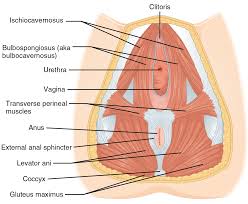 A hernia is a painful condition, so you no doubt want a quick answer to that question, “What are the Symptoms of a Hernia?” Unfortunately, this answer will greatly depend on your own assessment of yourself. In order to correctly identify a hernia, there are a few specific signs you should be looking for. If you are in intense pain and are seriously concerned, talk to your doctor. This article is solely intended to assist people dealing with minimal pain and are simply curious. It is not meant to be used in place of an accurate, medical evaluation.
A hernia is a painful condition, so you no doubt want a quick answer to that question, “What are the Symptoms of a Hernia?” Unfortunately, this answer will greatly depend on your own assessment of yourself. In order to correctly identify a hernia, there are a few specific signs you should be looking for. If you are in intense pain and are seriously concerned, talk to your doctor. This article is solely intended to assist people dealing with minimal pain and are simply curious. It is not meant to be used in place of an accurate, medical evaluation.
What is a Hernia?
In the abdominal cavity, the internal organs and structures are held in place by the abdominal muscles. Through typical use, the abdominal muscles, or abs, have a natural tension that can hold the contents of the abdominal cavity well. However, whether due to lack of use or overexertion, the integrity of the abdominal wall gives way and a small subsection of the intestines, or some other mass of tissue, protrudes out. This protrusion can potentially cause serious problems. For example, a hernia can lead to an intestinal blockage. This blockage is a serious issue and would require emergency medical attention.
The most important factor in the safety and recovery from a hernia is early identification. If closely monitored by a qualified medical professional from early on, the risk of hernia complication is greatly reduced.
Bulging
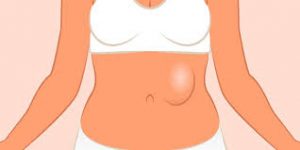 One of the most commonly noticed signs of a hernia is bulging. Due to the very nature of how a hernia works, the affected area will bulge, creating a lump that is the hernia itself. Identifying this lump is one of the most important diagnostic tools available. The exact location of the herniated lump will vary depending on the diagnosis. In general, the hernia will be in the region after which it is named. An umbilical hernia, for instance, is located in the umbilical region at the belly button.
One of the most commonly noticed signs of a hernia is bulging. Due to the very nature of how a hernia works, the affected area will bulge, creating a lump that is the hernia itself. Identifying this lump is one of the most important diagnostic tools available. The exact location of the herniated lump will vary depending on the diagnosis. In general, the hernia will be in the region after which it is named. An umbilical hernia, for instance, is located in the umbilical region at the belly button.
A femoral hernia can be found in the inner thigh area. An inguinal hernia is a hernia in the groin. Surgical hernias can also develop at the site of a relatively recent surgical incision.
Swelling
Another diagnostic sign of a hernia is swelling. Although easily confused with the bulging mentioned above, swelling is a separate and distinct symptom altogether. Swelling involves more than just visible confirmation. Swelling of the affected area will also bring redness, warmth, and discomfort when touched.
Pain
The pain associated with a hernia is different than the pain caused by other means. When dealing with a hernia, the level of pain will vary depending on position and motion. For example, most people complain of greater pain when bending, lifting, or even coughing. The pain that hernias produce can vary from person a person, but typically is a dull ache in the region affected.
The difficulty with dealing with hernia pain is it the pain is not constant. Many times, people feel the intense pain that comes from exerting pressure on a hernia and schedule an appointment with a doctor. However, by the time they go to the doctor, it has been long enough that they forget the exact nature of the pain they’re dealing with this can make it difficult to relay necessary information to your doctor.
—
After reading this, do you think you have a hernia? Schedule an appointment with the best surgeons in NYC to develop a custom plan for dealing with your hernia.
Call Today: 646 -846-1136
———
References:
https://www.uofmhealth.org/health-library/aba5300
https://www.webmd.com/digestive-disorders/types-of-hernias#1
https://nyulangone.org/conditions/hernia-in-adults/types
https://www.mayoclinic.org/diseases-conditions/inguinal-hernia/symptoms-causes/syc-20351547
Causes & Symptoms of Hernias
Hernias are widely common, with almost 2% of the population suffering from hernias. This may seem like a small number, but in the United States of America alone that adds up to around 600,000 people dealing with hernias. But what exactly is a hernia? What causes so many people to have hernias? And how does having a hernia affect you?
What is a Hernia?
A hernia is a protrusion of soft tissue, usually an organ or fat tissue, through the muscular lining that typically would hold it in place. One of the most common types of hernias is an inguinal hernia. In this case, the abdominal muscles that hold the intestines in place can grow weak and develop gaps that allow a small section of the intestine to jut out. This segment of the intestine can eventually become swollen, painful, and cause discomfort during regular tasks.
Many people complain of pain associated with bending, lifting, and coughing, as all of these activities create pressure on the herniated section of the abdominal cavity. Although a hernia itself may not be hazardous initially, it can lead to many other medical complications.
What Causes Hernias?
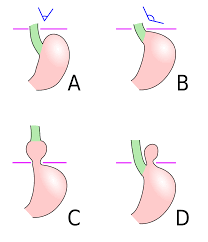
When the muscular lining that keeps organs in place grows weak, the integrity of the muscular “wall” can fail, creating weak spots. These spots can then become susceptible to internal structures pushing out and herniating. This herniation typically happens initially during a period of intense pressure. For example, exerting oneself while lifting an object can cause pressure in the abdominal cavity and result in a hernia.
Prolonged, chronic coughing can weaken the structural muscles in place, with repeated strain reducing the integrity of the muscle. Additionally, a surgical incision, if not provided enough time to heal properly, can facilitate a weak spot in the muscular lining and allow for herniation.
Congenital problems can also result in herniation in cases where the abdominal wall does not fully develop in utero. There are a number of complications that can increase the risk of herniation. This includes pregnancy, heavy lifting, rapid weight gain, chronic coughing, constipation, and recent surgical activity in the surrounding area.
What are the Symptoms of Hernias?
The most commonly reported symptom of a hernia is pain. The exact nature of the pain experienced varies from person to person, but many people note greater pain when additional pressure is applied to the abdominal region. This includes lifting, bending, coughing, or other physical exertion with straining.
Hernias are not always found as soon as they occur. Usually, it takes repeated pressure and exertion for the hernia to be noted. After a number of years, a hernia is usually identified correctly by self-assessment. A hernia does not correct itself, but would instead require surgical treatment to repair the damage.
Complications of Hernias
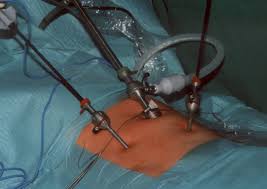
Although a hernia on its own does not require emergency treatment, there are a number of situations in which urgent action may be required. Herniated areas may not receive the blood supply they require and are at a higher risk of infection. If a hernia has become swollen, warmer than usual, or extremely painful, this can be a sign of infection. In addition, depending on the location, a hernia can cause obstruction to the bowel and digestive tract. This can quickly become an urgent situation requiring emergency medical correction.
Do you think you might have a hernia? Call the best surgeons in NYC to discuss your case and your treatment options.
———
References:
https://www.webmd.com/digestive-disorders/types-of-hernias#1
https://www.webmd.com/digestive-disorders/understanding-hernia-basics
What Is a Hernia?
 Most of you will have at least heard of a hernia. In fact, a good percentage of you almost certainly know someone who has suffered from one, but you might not know exactly what one is, perhaps because a description of a hernia actually makes it sound far worse than it is.
Most of you will have at least heard of a hernia. In fact, a good percentage of you almost certainly know someone who has suffered from one, but you might not know exactly what one is, perhaps because a description of a hernia actually makes it sound far worse than it is.
The good news is that hernias are relatively uncommon. in 2015, there we 18.5 million cases in a global population of roughly 7.2 billion people.
Essentially, a hernia is when an organ pushes through the muscle that holds it in place. They most commonly occur in the abdomen but are also sometimes seen in the groin and upper thigh. Fortunately, hernias aren’t immediately life-threatening, but they also won’t go away on their own and so hernia surgery NYC is sometimes required.
Inguinal
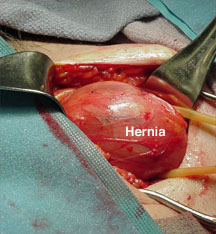 There are several different types of hernias with the most common, accounting for roughly 70% of cases, being inguinal hernias. Inguinal hernias are when the intestines force their way through the lower abdomen wall, in an area of the body known as the inguinal canal.
There are several different types of hernias with the most common, accounting for roughly 70% of cases, being inguinal hernias. Inguinal hernias are when the intestines force their way through the lower abdomen wall, in an area of the body known as the inguinal canal.
The Inguinal canal is in the groin. Because of the physiological differences between men and women in this area, this type is more common in men.
Hiatal
A hiatal hernia is when your diaphragm, a muscle used in the process of breathing, and which separates the organs in the abdomen from those in the chest, is intruded by part of the stomach, which pushes right through to the chest cavity. This type generally occurs in the younger population (under-50s); it is also one of the more likely hernias to be seen in children. Generally, when this occurs, it is because of a congenital defect.
Other Types of Hernia
 These are the most common types of hernia, but others can occur. An umbilical hernia is sometimes seen in infants less than 6 months old and it occurs when the intestines push through the abdomen wall. This type of hernia is often accompanied by a noticeable bulge in the belly. Fortunately, this is the only type which sometimes spontaneously heals. After abdominal surgery, an incisional hernia can occur if the intestines push through the incision wound.
These are the most common types of hernia, but others can occur. An umbilical hernia is sometimes seen in infants less than 6 months old and it occurs when the intestines push through the abdomen wall. This type of hernia is often accompanied by a noticeable bulge in the belly. Fortunately, this is the only type which sometimes spontaneously heals. After abdominal surgery, an incisional hernia can occur if the intestines push through the incision wound.
While hernias are relatively common they are fortunately easy to treat. Visit our renowned Surgery NYC clinic if you are concerned and would like a consultation.
















